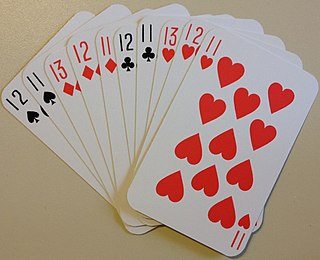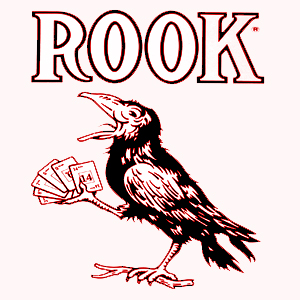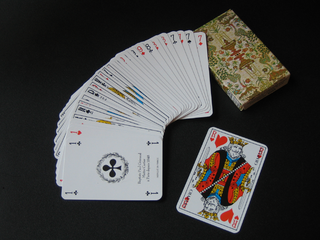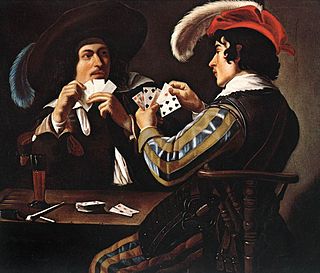
500 or five hundred, also called bid Euchre is a trick-taking game that is an extension of euchre with some ideas from bridge. For two to six players, it is most commonly played by four players in partnerships, but is sometimes recommended as a good three-player game. It arose in America before 1900 and was promoted by the United States Playing Card Company, which copyrighted and marketed the rules in 1904. 500 is a social card game and was highly popular in the United States until around 1920 when first auction bridge and then contract bridge drove it from favour. 500 continues to enjoy popularity in Ohio and Pennsylvania, where it has been taught through six generations community-wide, and in other countries: Australia, New Zealand, Canada (Quebec) and Shetland. The originator of Five Hundred, US Playing Card Company of Cincinnati, Ohio, now has headquarters across the Ohio River in Erlanger, Kentucky, west of Covington, KY. Five hundred is now the national game of Australia.

Euchre or eucre is a trick-taking card game most commonly played with four people in two partnerships with a deck of 24, 28, or sometimes 32, standard playing cards. It is the game responsible for introducing the joker into modern packs; this was invented around 1860 to act as a top trump or best Bower. It is believed to be closely related to the French game Écarté that was popularized in the United States by the Cornish and Pennsylvania Dutch, and to the seventeenth-century game of bad repute Loo. It may be sometimes referred to as Knock Euchre to distinguish it from Bid Euchre.

Spades is a trick-taking card game devised in the United States in the 1930s. It can be played as either a partnership or solo/"cutthroat" game. The object is to take at least the number of tricks that were bid before play of the hand began. Spades is a descendant of the Whist family of card games, which also includes Bridge, Hearts, and Oh Hell. Its major difference as compared to other Whist variants is that, instead of trump being decided by the highest bidder or at random, the Spade suit always trumps, hence the name.

Forty-Fives is a trick-taking card game that originated in Ireland. The game is popular in many communities throughout Atlantic Canada as well as the Gaspé Coast in Québec. Forty-fives is also played in parts of Massachusetts and southern New Hampshire in New England, United States, as well as in the South Island of New Zealand.

Rook is a trick-taking game, usually played with a specialized deck of cards. Sometimes referred to as Christian cards or missionary cards, Rook playing cards were introduced by Parker Brothers in 1906 to provide an alternative to standard playing cards for those in the Puritan tradition or Mennonite culture who considered the face cards in a regular deck inappropriate because of their association with gambling and cartomancy.
Pedreaux is an American trick-taking card game of the All Fours family based on Auction Pitch. Its most popular variant is known as Cinch, Double Pedro or High Five. Developed in Denver, Colorado, in the 1880s, it was soon regarded as the most important member of the All Fours family. Although it went out of fashion with the rise of Auction Bridge, it is still widely played on the western coast of the United States and in its southern states, being the dominant game in some locations in Louisiana. Forms of the game have been reported from Nicaragua, the Azores, Italy and Finland. The game is primarily played by four players in fixed partnerships, but can also be played by 2–6 individual players.

Bid whist is a partnership trick-taking variant of the classic card game whist. As indicated by the name, bid whist adds a bidding element to the game that is not present in classic whist. It is generally accepted that the game of bridge came from the game of whist. Bid whist, along with spades, remains popular particularly in U.S. military culture and a tradition in African-American culture with probable roots in the period of slavery in the United States.
Pitch is an American trick-taking card game derived from the English game of All Fours. Historically, Pitch started as "Blind All Fours", a very simple All Fours variant that is still played in England as a pub game. The modern game involving a bidding phase and setting back a party's score if the bid is not reached came up in the middle of the 19th century and is more precisely known as Auction Pitch or Setback. Whereas All Fours started as a two-player game, Pitch is most popular for three to five players. Four can play individually or in fixed partnerships, depending in part on regional preferences. Auction Pitch is played in numerous variations that vary the deck used, provide methods for improving players' hands, or expand the scoring system. Some of these variants gave rise to a new game known as Pedro or Cinch.

Sheng ji is a family of point-based, trick-taking card games played in China and in Chinese immigrant communities. They have a dynamic trump, i.e., which cards are trump changes every round. As these games are played over a wide area with no standardization, rules vary widely from region to region.

Bid Euchre, Auction Euchre, Pepper or Hasenpfeffer, is the name given to a group of card games played in North America based on the game Euchre. It introduces an element of bidding in which the trump suit is decided by which player can bid to take the most tricks. The primary differences are the number of cards dealt, absence of any undealt cards, the bidding and scoring process, and the addition of a no trump declaration. It is typically a partnership game for four players, played with a 24, 32 or 36-card pack, or even two decks of 24 cards each. It should not be confused with another game also called Bid Euchre q.v. Five Hundred.
304, pronounced three-nought-four, is a trick-taking card game popular in Sri Lanka, coastal Karnataka, Tamil Nadu and Maharashtra, in the Indian sub continent. The game is played by two teams of two using a subset of the 52 standard playing cards.
Smear is a North-American trick-taking card game of the All Fours group, and a variant of Pitch (Setback). Several slightly different versions are played in the Upper Peninsula of Michigan, Minnesota, Northern and Central Iowa, Wisconsin and also in Ontario, Canada.

Manille is a French trick-taking card game which uses a 32 card deck. It spread to the rest of France in the early 20th century, but was subsequently checked and reversed by the expansion of Belote. It is still popular in France and the western part of Belgium.

Dummy whist is one of many variants of the classic trick-taking card game Whist. The general rules of dummy whist are similar to that of bid whist, with two notable exceptions. Bid whist is played by four players, whereas dummy whist is played by only three. Secondly, instead of dealing a kitty, a dummy hand is dealt to be on the team of the player who wins the auction.

Bacon, sometimes called American Euchre, is a trick-taking card game which resembles a simplified version of Euchre. It differs from Euchre in that it uses a full 52-card Anglo-American deck, has a slightly modified scoring system and trump selection system, uses a normalized card ordering to make it easier to learn, and adds the aspect of permission. It originated in the mid-to-late 1900s and is somewhat popular in the Eastern United States. It is one of the simpler trick-taking games and is a good game for introducing the concept of trumps to inexperienced players.

Euchre has many variations in game playing. Some of them are designed for two, three, five or even six hands. Described below are some of these variations. Some are called “Johann.”
Clag or Clagg is a trick-taking card game using a standard deck of 52 playing cards. It is similar to Whist or Oh Hell, and can be played with up to seven players.
German Solo, known locally just as Solo and, historically as German Ombre, is a German 8-card plain-trick game for four individual players using a 32-card, German- or French-suited Skat pack. It is essentially a simplification of Quadrille, itself a four-player adaptation of Ombre. As in Quadrille, players bid for the privilege of declaring trumps and deciding whether to play alone or with a partner. Along with Ombre, Tarock and Schafkopf, German Solo influenced the development of Skat.

The card game of Bauernschnapsen is an expanded form of the popular Austrian card game of Schnapsen, played by four players. This variant of Schnapsen is played throughout the whole of Austria.

Dreierschnapsen, Talonschnapsen or Staperlschnapsen is a three-hand variant of the popular Austrian card game, Bauernschnapsen. The rules are very similar to those for Bauernschnapsen except that, instead of two teams of two players, one player bids to become the soloist against the other two who form a temporary alliance. Another difference is that the game makes use of a talon with which the soloist may exchange cards to improve his hand, hence its alternative name of Talonschnapsen. The game is usually played with William Tell cards.













